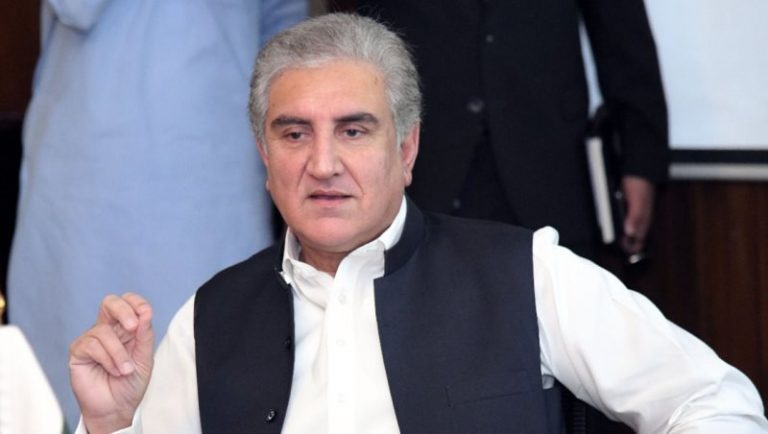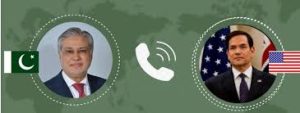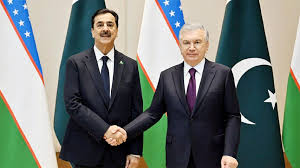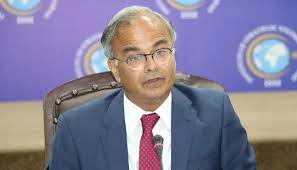FM spells out contours of Pakistan’s successful foreign policy during last year

Islamabad: Foreign Minister Shah Mahmood Qureshi Monday said that Pakistan achieved historic milestones at the diplomatic fronts through robust economic, public and science diplomacy.
Addressing a presser to highlight last year’s achievements, the foreign minister termed the previous year as a significant one as Pakistan had been proactively and consistently advanced its diplomatic objectives on a range of diplomatic fronts both bilaterally and multilaterally.
He said besides, consolidating friendships, Pakistan further strengthened its bilateral ties with the major powers and key partners across the globe.
“Under the leadership of Prime Minister Imran Khan, Pakistan continues to be a leading voice at world fora, with strong advocacy on issues of sustainable and equitable development, climate change, debt relief for the developing countries, corruption, illicit financial flows and Islamophobia,” he said.
The foreign minister said the major shift in the foreign policy was achieved through increased focus on geo-economics leveraging its geo-political significance.
Qureshi further highlighted that in 2021, about 85 bilateral exchanges with over 50 countries and 35 senior leadership visits to Pakistan had taken place.
Besides, over 50 high level multilateral engagements, participation at 35 international forums and 32 senior leadership visits by Pakistan were recorded during the previous years, he added.
The foreign minister further said that five Pakistan’s sponsored/cosponsored resolutions were adopted by the UN. A total of 114 Pakistan missions were made to function online through three popular social media plateforms.
The foreign minister also mentioned success through geo-economics policy with focus on export and investment promotion, increasing investor confidence, enhancing remittance inflows, tourism promotion, and broadening of trade ties with host countries.
This led to improvement by 39 points in Pakistan’s ranking in ease of doing business, 7% increase in trade with Africa, improvement by 59 points in Pakistan’s Business Confidence Ranking, USD 2.9 billion deposited in 299000 accounts across 175 countries in Roshan Digital Accounts, USD 2 billion invested in Naya Pakistan certificates, 24.1% increase on home remittances to a record high of USD 18.7 billion (during 8 months of FY 2020-21), an increase of over USD 2 billion in the export of information technology and information technology-enabled sectors.
The foreign minister said Pakistan and Saudi Arabia signed 7 MoUs/Agreements including the MoU to operationalize Saudi-Pakistan Supreme Coordination Council (SPSCC).
Pakistan’s exports to and remittances from KSA and UAE grew, and a record number of manpower was exported to Qatar in 2021. Kuwait eased visa restrictions for Pakistani nationals, and under the bilateral agreement on recruitment of healthcare professionals, around 1800 personnel from Pakistan have already reached Kuwait.
About ties with China, he said, 2021 marked an important milestone in Pak-China friendship, as the two countries celebrated the 70th anniversary of the establishment of diplomatic relations in a befitting manner with over 140 events and activities held across Pakistan and China.
“These events reinvigorated the sentiments of bilateral ties, reaffirmed our determination to strengthen all-weather strategic cooperative partnership, continue our joint efforts for the high quality development of CPEC and further elevate Pakistan China friendship to a new pedestal of bilateral cooperation, as envisaged by the leadership and peoples of the two countries,” he added.
The foreign minister further elaborated that Pakistan’s exports to China during the first ten months of 2021 were recorded at US $ 2.85 billion (growth of 77% year-on-year). China remained the largest source of Net FDI to Pakistan.
The foreign minister reaffirmed Pakistan’s willingness to host the 19th SAARC Summit and invited India to virtually attend the event.
He regretted that India’s continuous negative attitude had made the most effective forum for economic cooperation and development dysfunctional.
He said Pakistan was keen to further boost its bilateral ties with Bangladesh and Sri Lanka.
About relations with India, the foreign minister said unfortunately, the prospects of durable peace and stability in the region, and the great potential for economic development and regional cooperation have been held hostage by the hegemonic and hostile behavior of India, whose BJP-RSS Hindutva inspired leadership had adopted a particularly irresponsible and politically motivated anti-Pakistan posture, and a patently anti-Muslim approach at home.
He said India’s unilateral and illegal actions in Indian Illegally Occupied Jammu and Kashmir (IIOJK) since 5 August 2019 aimed at undermining the status of the disputed territory, perpetuating its illegal occupation, and altering its demographic structure, and the unabated widespread violations of human rights and international humanitarian law and state-terrorism against the innocent Kashmiris had further vitiated the environment and threatened international peace and security.
“Pakistan desires friendly relations with all its neighbours including India. But as the prime minister has said, the onus is on India to take necessary steps to create an environment conducive for dialogue. Resolution of Jammu and Kashmir dispute is a prerequisite for durable peace and stability in South Asia,” Qureshi reiterated.
The foreign minister further elaborated that in one of the biggest ever crackdowns in the IIOJK, 1400 Kashmiris were arrested arbitrarily in October, 2021. Since 5 August 2019, more than 502 Kashmiris have been martyred by Indian occupation forces in fake encounters and extra-judicial operations. Out of these around 78 persons had been martyred in Indian custody.
The UNSC has deliberated the Jammu and Kashmir issue three times since 5 August 2019. The UN Secretary-General has called on all parties to refrain from taking steps that could affect the status of Jammu and Kashmir, he added.
The foreign minister reaffirmed that Pakistan would continue to extend all possible moral and diplomatic support to the Kashmiri people in their just struggle for self-determination.
He said that developments in Afghanistan presented a major challenge to Pakistan as the immediate neighbour as the consequences of instability in Afghanistan always impacted Pakistan.
In the post 15 August period, Pakistan played a pivotal role in the safe evacuation of over 80,000 individuals across 42 nationalities, consisting of diplomats, International NGO workers, the media and many, many others.
The government of Pakistan also pledged Rs5 billion aid to Afghanistan, the first consignments of which had already started, he said.
Qureshi said Pakistan geared its diplomacy in advocating and garnering regional and international consensus on the need for constructive and sustained engagement with the new interim authorities in Afghanistan over the humanitarian crisis and the risk of economic collapse.
He cited Pakistan’s participation in the Moscow format Troika Plus Meeting held in Islamabad in this regard.
The foreign minister also termed holding of extraordinary session of the OIC Council of Foreign Ministers hosted by Pakistan to focus on the humanitarian situation in Afghanistan, as another sincere effort which led to establishment of a Humanitarian Trust Fund under the Islamic Development Bank, launching of a food security programme and appointment of a Special Envoy of the OIC Secretary-General.
He said that in the wake of the OIC Conference, the adoption of UN Security Council resolution reaffirmed that the provision of humanitarian and other assistance to Afghanistan was not a violation of UN sanctions.
In line with the ‘Vision Central Asia’, Pakistan pursued active diplomatic outreach to the Central Asian Republics (CARs) with visits and participation of the senior leadership from different countries.
Engagement with East Asian partners continued under Vision East Asia policy, he added.
“With the Russian Federation, there was growing warmth and strengthening of relations. Bilateral trade increased by 20 percent during the first ten months. We also maintained close engagement on Afghanistan,” he further added.
About Pak-US ties, he said Pakistan remained committed to the longstanding relationship with the United States and looks forward to expanding it as a broad-based mutually beneficial partnership.
“Pakistan’s exports to the United States rose by 39 percent to cross the $5 billion mark for the first time. As a result of the Government’s efforts, Pakistan was included in Amazon’s Seller’s List. The United States supported Pakistan’s Covid-19 response through the provision of 27.6 million doses of coronavirus vaccines. We also maintained close engagement on Afghanistan,” he added.
Qureshi said through ‘Engage Africa Policy’, there were a series of substantive and unprecedented initiatives during the year.
Of the five new Missions to be established, Kigali became operational in March. Pakistan hosted virtual celebrations of Africa Day with 27 African nations, and celebrated ‘Pak-Africa Friendship Day’ in 15 African capitals.
“We signed 12 MoUs on BPC with Various African countries and 1 MoU on Visa Abolition with Senegal,” he said.
The foreign minister further informed that in January this year, Pakistan would assume chairmanship of the Group of 77 and China – the largest grouping of developing countries in the UN.
Earlier Pakistan served as the president of ECOSOC for the term 2020-2021. During last year, Pakistan got elected to 7 UN bodies, he added.
To a query about certain social media contents over the Pak-Afghan border fencing, the foreign minister said that they had friendly ties with Afghanistan and through diplomatic means, they would resolve any issue. He said Pakistan would protect its interests.
Responding to another question, he maintained that Pakistan and China enjoyed time-tested ties and the US understood it.
About the democratic system in the country, the foreign minister said that it was strengthening as the democratic setups were replacing each other after the completion of their tenures in the government through a democratic transition.





